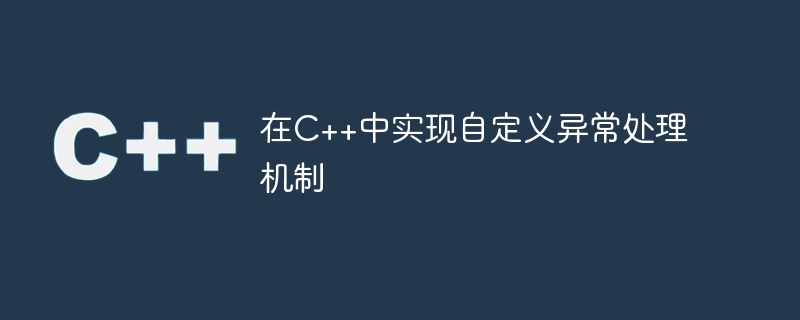Home >Backend Development >C++ >Implement custom exception handling mechanism in C++
Implement custom exception handling mechanism in C++
- WBOYWBOYWBOYWBOYWBOYWBOYWBOYWBOYWBOYWBOYWBOYWBOYWBOriginal
- 2023-08-22 17:04:491434browse

In C, the exception handling mechanism is a very important programming skill. It allows the program to cope with and handle errors or abnormal situations to avoid program crashes or throws. An unknown exception occurred. However, in C, the default exception handling mechanism can only catch some known exception types and cannot handle custom exception types. Therefore, in this article, we will introduce how to implement a custom exception handling mechanism in C.
Custom exception class
First, we need to define a custom exception class to represent a specific exception type. In C, we can define our own exception class by inheriting the std::exception class. Here is an example of a simple custom exception class:
#include <exception>
#include <string>
class MyException : public std::exception {
public:
MyException(const std::string& msg) : m_msg(msg) {}
virtual const char* what() const noexcept override {
return m_msg.c_str();
}
private:
std::string m_msg;
};In the above code, we have defined a custom exception class called MyException. This class inherits from the std::exception class and implements the what() method of this class. This method is used to return exception details.
Throw a custom exception
When using a custom exception class, we need to instantiate an object of this class first, and then use the throw keyword to throw it. For example, we can use the following code to throw a custom exception in the program:
throw MyException("Something wrong happened!");Catch custom exception
When catching a custom exception, we need to use a try-catch statement block. For example, the following code demonstrates how to catch MyException:
try {
// some code that may throw MyException
} catch (const MyException& e) {
// handle the exception here
std::cerr << "Caught MyException with message: " << e.what() << '
';
}If the program throws an exception of type MyException in the try statement block, the catch statement block will capture the exception and execute the corresponding exception handling code .
Custom exception handling function
In order to better handle custom exceptions, we can define a function to handle all types of exceptions. For example, in the following code, we define a function named handleException to handle all types of exceptions:
#include <iostream>
void handleException(const std::exception& e) noexcept {
std::cerr << "Caught exception with message: " << e.what() << '
';
}
int main() {
try {
// some code that may throw an exception
} catch (const std::exception& e) {
handleException(e);
}
}In the above code, we use a function named handleException to handle all types of exceptions abnormal. In the program, if the program throws any type of exception, the exception will be passed to the handleException function and handled.
Summary
In C, custom exception handling mechanism is a very useful technique. It can help us better handle exceptions in the program and avoid program crashes or throwing unknown exception. In this article, we introduced how to define your own exception class and use try-catch statement blocks to catch and handle custom exceptions. At the same time, we also introduced how to define a function to handle all types of exceptions to better organize and manage the exception handling logic of the program.
The above is the detailed content of Implement custom exception handling mechanism in C++. For more information, please follow other related articles on the PHP Chinese website!

